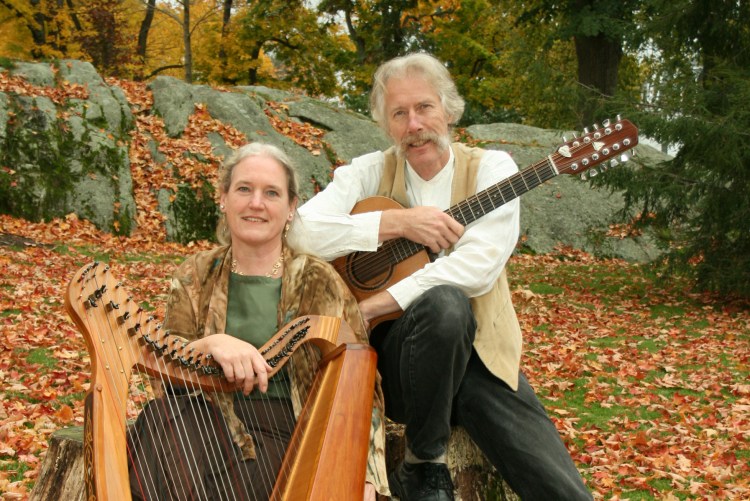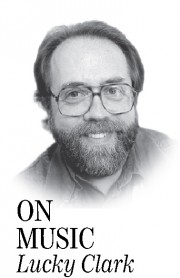When it comes to Celtic and folk music, Maine’s own Castlebay has been doing it about as long as anyone else and doing it very well, indeed. Made up of multi-instrumentalist/vocalist Fred Gosbee and Celtic harpist/vocalist Julia Lane, this duo can trace its roots back to 1987 when, as a trio, they began mining the archives at the Maine Folklife Center, the Library of Congress, Harvard’s Houghton Library, the Helen Hartness Flanders collection in Vermont and similar locations to find as much of Maine’s musical and historical past as possible. They have released 27 recordings over those 32 years and entertained audiences up and down the East Coast, around the country and across the Atlantic to Ireland, Scotland and England. On April 7, they will return to UMA’s Jewett Auditorium for a show at 2

p.m. To that end, I arranged a phone interview on March 19 with Julia Lane, as they were traveling in Florida.
Q: It’s been quite awhile since you and I last talked, and seeing you two are coming back to Jewett, it’s nice to be chatting again, that’s for sure. What has Castlebay been up to recently?
Lane: Well, we’ve been flying a bunch of different kites, and I’d like to focus on the kite that we’ll be flying for the Augusta show, which is the “Bygone Ballads of Maine.”
Q: Great! I think it’s wonderful that you’re preserving these gems of our state’s history.
Lane: The thing that we want to do more than preserve is to keep them alive. I mean, they are preserved in archives, in recordings and manuscripts and stuff, but preserving isn’t enough. It doesn’t keep them alive. So our goal is to bring them out into the light, dust them off and play them ourselves, but also to create a resource that’s accessible to other people that want to play these songs: to use them for educational purposes or even genealogical purposes. We found a bunch of stuff in genealogical accounts of families — they’re like snapshots or photographs or bits of social history that have to be brought out so people can appreciate them. That’s our goal.
Q: Now, when you talk about recordings, are those like field recordings?
Lane: Yes, there are a number of field recordings done by about five different collectors who were going through New England. The biggest one is the Helen Hartness Flanders collection, which is housed both in Vermont and the Library of Congress, and she was collecting in the ’40s.
Q: How many songs are in her collection, just out of curiosity?
Lane: There are 3,000 songs. Of those, I have found a very small percentage of fiddle tunes. They’re all a cappella songs with stories attached to them, and that to me is like a gold mine of social history and cultural richness — it’s so exciting.
Q: I can imagine. What are the ones that excite you the most?
Lane: Well, it’s the ballads that really interest us, and I should add that of those 3,000 songs, 900 of them are from Maine, more or less. So we’re going through those — and the ones from other collectors — and transcribing them, choosing the ones we like to pass on ourselves and then trying to make the whole shebang available for others to pick the ones they like. (Chuckle) So, it’s going to take us a while. By the way, the songs that I sent you are on our first recording of this stuff, which is “Bound Away, Seafaring Songs of Maine.”
Q: And I thank you for those MP3s. I like to hear samplings of what you’ll be doing, so I can prepare for our conversation a little better. What else is happening with you nowadays?
Lane: Well, the first volume of my book, which I’m publishing this summer, will be seafaring songs, and there are 170 in that book. And then we’re thinking about doing songs that have to do with Maine history for 2020 — obviously, it makes sense to do that.
Q: Yeah, seeing that’s our state’s bicentennial year. What kind of material will be used for that release?
Lane: There will be Civil War songs, 1812 songs, gold rush/gold mining songs — stuff where people were interacting with historic events and writing about them. I found a bunch of gold mining songs in a collection in California that specifically mentions people from Maine.
Q: Oh, wow — that’s cool!
Lane: Yeah, one thing leads to another. This rabbit hole (pause), I’m in Wonderland here — this amazing journey as things guide me to different resources and finding great stuff. It’s an adventure.
Q: It sounds like you have your work cut out for you, that’s for sure.
Lane: Yeah, but it’s something I’ve always really enjoyed doing. Ever since I was a kid, I always liked the songs that had stories in them. It’s like learning history by singing it, which is actually a really, really old tradition of learning, and that’s why the ballads were written in the first place.
Q: How so?
Lane: It was to guide people through their cultural story, and for people that didn’t read music, it was a way to preserve that cultural story. And they sang all the time. They sang when they were working; they sang when they were resting; they sang for each other for entertainment; they sang to instruct children. So, it was much less of a performance-based tradition. Yes, they had the seanchaí or the bard who people would gather around and hear that person, but the people themselves were singing for each other all the time. That’s something we’ve lost; people just don’t do that anymore.
Q: Yeah, and I think we’re missing out quite a lot by not doing that.
Lane: Yes, we are — we really are.
Q: Is there anything, Julia, that you’d like to have passed on to the folks reading this article?
Lane: Oh, gosh, I would just say: Sing the songs and speak your truth, and ask your elders about the songs that they sang. Don’t be shy to dig into your own family history, because you’re going to find some really wonderful stuff there that you don’t want to lose. It’s very much a part of our cultural history and our cultural story. I think it’s really important for people to not just put these things aside but to remember.
Lucky Clark has spent 50 years writing about good music and the people who make it. He can be reached at luckyc@myfairpoint.net if you have any questions, comments or suggestions.
Send questions/comments to the editors.




Comments are no longer available on this story